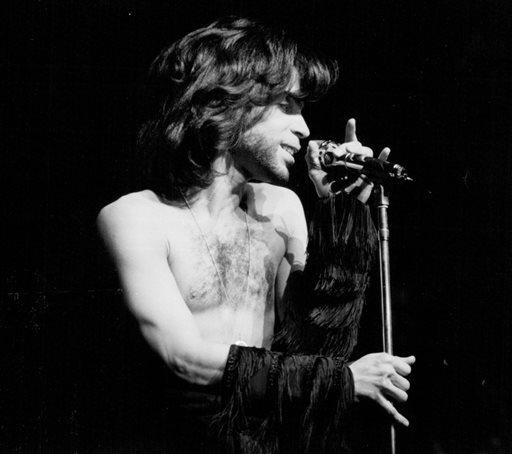
This May 1, 1990 photo, Prince performs a benefit in memory of ex-bodyguard Chick Huntsberry in Minneapolis. Prince, widely acclaimed as one of the most inventive and influential musicians of his era with hits including “Little Red Corvette,” ”Let’s Go Crazy” and “When Doves Cry,” was found dead at his home on Thursday, April 21, 2016 in suburban Minneapolis, according to his publicist. He was 57. (David Brewster/Star Tribune via AP)
NEW YORK—On Prince’s 1981 album “Controversy,” released days after he opened for the Rolling Stones dressed in bikini underwear and got booed off stage, the singer quipped that he was asked constantly if he was black or white, straight or gay.
The pop icon, who died suddenly Thursday at age 57, oozed sexuality both through his music and his inimitable fashion sense as he turned androgyny into a stylistic symbol.
READ: Prince passes away
But unlike another recently deceased music great, David Bowie, or his contemporary Madonna, Prince’s gender-bending did not take on a message of empowerment with the singer later surprising many fans with his religious views and hesitance at gay rights.
Rock music and sex have always been bedfellows but Prince took lasciviousness to heights that would make even some listeners with contemporary sensibilities blush.
His first three albums — “For You,” “Prince” and “Dirty Mind” — brought in liberal doses of sex that reinforced the artist’s emerging brand of instantly danceable funk.
“Dirty Mind” featured one of Prince’s most controversial songs, “Head,” a graphic tale of a virgin bride in her wedding dress giving him oral sex.
“Controversy” brought similarly unabashed sexuality on tracks such as “Do Me, Baby” and “Jack U Off” but the subject matter suddenly took on a political dimension in the new conservative era of president Ronald Reagan, whom Prince criticized by name.
His aptly named “The Scandalous Sex Suite” in 1989 was marked by erotic noises from actress Kim Basinger.
But Prince set off the row with the most impact through his classic 1984 album “Purple Rain” on “Darling Nikki,” a song that starts with a girl masturbating in a hotel lobby.
The song, originally targeted at a character in the movie version of “Purple Rain,” set off a scandal when the young daughter of then US senator Al Gore heard it.
His wife, Tipper Gore, responded with a campaign that eventually led to record labels placing stickers to warn parents of explicit lyrics, a system still in place today.
Ultra-sexy outfits
Prince stood just five feet two (1.57 meters) but his height was no obstacle to attraction, with many people who encountered him remarking on his sheer physical beauty.
And he was not bashful about showing his body. The cover to his self-titled 1979 album depicted a nude Prince from the chest up, his hair wild and a sultry look in his eyes, while he appeared fully naked in a more cherubic pose on 1988’s “Lovesexy.”
Prince most often wore purple, his signature color, but was daring in his choice of outfits from frizzy pink stoles to sequined blue hoodies to black-and-white polka dots.
He embraced women’s clothing from high heels to female underwear. His most daring appearance, however, may have been at the MTV Video Music Awards in 1991.
Prince emerged in a yellow suit and elegantly snapped up his guitar, before the crowd realized that his outfit showed his bare buttocks. As if that were not enough, his back-up dancers acted out a scene of group sex.
A religious turn
Prince detested labels, as he indicated in “Controversy.” Yet to many, the answer to the question he posed in the song became clear — Prince’s androgyny had little to do with sexual orientation.
READ: Prince’s own words describe mixed feelings about the web
Prince surprised some of his large base of gay fans when, in 2008, he appeared to oppose same-sex marriage when asked by a reporter.
“God came to earth and saw people sticking it wherever and doing it with whatever, and he just cleared it all out. He was, like, ‘Enough,'” Prince told The New Yorker magazine.
Prince would refuse to let reporters record interviews and his entourage played down the remarks, with the singer later steering clear of the issue.
Wendy Melvoin, a former guitarist with his band The Revolution who is lesbian, told Out magazine in 2009 that Prince never came off as gay but instead as a woman.
“He looked at me like a gay woman would look at another woman,” she said.
The singer’s worldview appeared to harden after he became a Jehovah’s Witness in 2001 following discussions with Larry Graham of Sly and the Family Stone, the funk band that deeply influenced Prince.
Prince became so attached to his faith, which encourages proselytization, that he reportedly sought converts door-to-door in his native Minnesota, introducing himself by his name of Prince Nelson.
The late-career Prince would refuse to sing racy songs such as “Darling Nikki” but, ever the paradox, his new music still had plenty of sex.
Even back in 1985, the singer told Rolling Stone that he was not as much of a “wild sexual person” as imagined.
“Nobody can be what they are 24 hours a day, no matter what that is. You have to eat, you have to sleep, you have to think, and you have to work.”